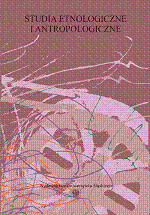Miasto starych ludzi. Nowa Huta i jej mieszkańcy
The city of old people. Nowa Huta and its inhabitants
Author(s): Renata HołdaSubject(s): Anthropology
Published by: Wydawnictwo Uniwersytetu Śląskiego
Summary/Abstract: The propaganda literature of the period of creation of a metallurgic conglomerate and “new city” connected to it nearby Kraków, ideologically juxtaposed the young against the old, implying a tendency to radical social changes in the case of the former. It was young people coming from the whole country and deriving mainly from the rural environment, fancing themselves an avantgarde of socialism that constituted 80% of builders, and, later on, inhabitants of Nowa Huta. In spite of having included the very district into the administrative borderlines of Kraków, the integration of the two parts of the city was impossible for many decades, which was largely caused by mutual prejudices, deriving from the cultural differences of communities inhabiting it. At that time, the image of Nowa Huta as a district touched by various pathologies and, thus, extremely dangerous, was ingrained in the so called common belief. The very stereotype was rooted by a series of articles on the examples of violence connected to the subculture of blockers from Nowa Huta. It resulted in, among other things, the fall of attractiveness of the very district as a potential place of living and, consequently, the outflow of young, rich and industrious people choosing the places of a greater prestige. In connection with natural demographic processes, the former district of youth became a city of “old people” at the beginning of the 21st century. However, there is much evidence that the history of this “youngest district of Kraków” has not finished. At present, on the rising tide of interests with socialism, one can observe the attempts of Nowa Huta revitalization which is connected with the exploration of its original past. The district is also becoming a witness of interesting cultural initiatives and happenings presenting a new perspective on the period of the formation of socialism. Of course, the very situation is, above all, commercial in nature, but in many inhabitants of blocks of flats in Nowa Huta, evokes pride, constituting, at the same time, the element of community formation and identity creation.
Journal: Studia Etnologiczne i Antropologiczne
- Issue Year: 2010
- Issue No: 10
- Page Range: 326-337
- Page Count: 12
- Language: Polish

